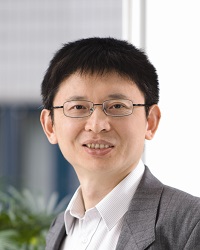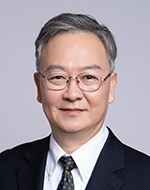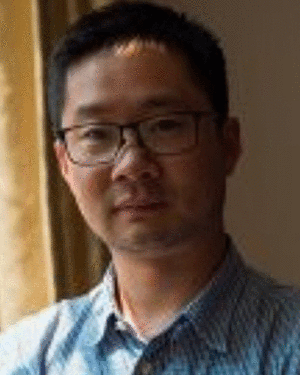
| Professor FENG Gang Gary IEEE Fellow City University of Hong Kong, China Biography: Gang Feng received the B.Eng and M.Eng. Degrees in Automatic Control from Nanjing Aeronautical Institute, China in 1982 and in 1984 respectively, and the Ph.D. degree in Electrical Engineering from the University of Melbourne, Australia in 1992. Speech Title: On Intelligent Fuzzy Control Abstract: This talk first gives a brief overview on fuzzy logic and fuzzy control, highlighting the myth on fuzzy logic and several fuzzy control methods. It then presents the key idea of model based fuzzy control including its motivation and advantages. Finally, some challenges in fuzzy control are revealed. |
| Professor Mo-Yuen Chow IEEE Fellow Shanghai Jiao Tong University, China Biography: Mo-Yuen Chow earned his degree in Electrical and Computer Engineering from the University of Wisconsin-Madison (B.S., 1982); and Cornell University (M. Eng., 1983; Ph.D., 1987). Dr. Chow joined as a Professor at Shanghai Jiao Tong University in 2022. He is an Emeritus Professor in the Department of Electrical and Computer Engineering at North Carolina State University. Dr. Chow’s recent research focuses on distributed control and management, smart micro-grids, batteries management, and mechatronics systems. Dr. Chow has established the Advanced Diagnosis, Automation, and Control Laboratory. He is an IEEE Fellow, the Co-Editor-in-Chief of IEEE Trans. on Industrial Informatics 2014-2018, Editor-in-Chief of IEEE Transactions on Industrial Electronics 2010-2012. He has received the IEEE Region-3 Joseph M. Biedenbach Outstanding Engineering Educator Award, the IEEE ENCS Outstanding Engineering Educator Award, the IEEE ENCS Service Award, the IEEE Industrial Electronics Society Anthony J Hornfeck Service Award, and the IEEE Industrial Electronics Society Dr.-Ing. Eugene Mittelmann Achievement Award. He is a Distinguished Lecturer of IEEE Industrial Electronics Society. Speech Title: Dynamic Microgrids and Energy Storage Management: Rethinking"Digital Twins"for Battery Situation Awareness in Multi-agent System Abstract: With the escalating energy demands, dwindling conventional resources, and growing pursuit of sustainability, multi-agent systems have emerged as an effective solution for dynamic, efficient, adaptable and systematic microgrid energy management. The battery digital twin, as an essential component of this multi-agent system for managing distributed energy resources (DERs), possesses the capability to simulate the intricate behaviors of the battery system under a wide range of environmental conditions, thereby enabling diverse situation awareness. This presentation will discuss the development of battery digital twin, integrating technologies of physics-based model and big data analytics, serving for incipient fault detection and battery performance optimization. It will demonstrate how the battery digital twin is incorporated into Networked Microgrids (NMG) as a part of multi-agent system. It will primarily cover the advancements in Dynamic Collaborative Distributed Energy Management Systems and Smart Battery Gauge by the Advanced Diagnosis, Automation, and Control (ADAC) Laboratory at Shanghai Jiao Tong University, and introduce the initiatives of the Yangtze Delta Energy Management Systems Consortium Plus (YD-EMSC+). |
| Professor Dongrui Wu IEEE Fellow Huazhong University of Science and Technology, China Biography: Dongrui Wu received a B.E in Automatic Control from the University of Science and Technology of China, Hefei, China, in 2003, an M.Eng in Electrical and Computer Engineering from the National University of Singapore in 2006, and a PhD in Electrical Engineering from the University of Southern California, Los Angeles, CA, in 2009. He is now Professor and Deputy Director of the Key Laboratory of the Ministry of Education for Image Processing and Intelligent Control, School of Artificial Intelligence and Automation, Huazhong University of Science and Technology, Wuhan, China. Prof. Wu's research interests include affective computing, brain-computer interface, computational intelligence, and machine learning. He has 150 publications (6,400+ Google Scholar citations; h=39), including a book "Perceptual Computing" (Wiley-IEEE Press, 2010), and five US/PCT patents. He received the IEEE International Conference on Fuzzy Systems Best Student Paper Award in 2005, the IEEE Computational Intelligence Society (CIS) Outstanding PhD Dissertation Award in 2012, the IEEE Transactions on Fuzzy Systems Outstanding Paper Award in 2014, the North American Fuzzy Information Processing Society (NAFIPS) Early Career Award in 2014, the IEEE Systems, Man and Cybernetics (SMC) Society Early Career Award in 2017, and the IEEE SMC Society Best Associate Editor Award in 2018. He was a finalist of the IEEE Transactions on Affective Computing Most Influential Paper Award in 2015, the IEEE Brain Initiative Best Paper Award in 2016, the 24th International Conference on Neural Information Processing Best Student Paper Award in 2017, the Hanxiang Early Career Award in 2018, and the USERN Prize in Formal Sciences in 2019. He was a selected participant of the Heidelberg Laureate Forum in 2013, the US National Academies Keck Futures Initiative (NAKFI) in 2015, and the US National Academy of Engineering German-American Frontiers of Engineering (GAFOE) in 2015. His team won the First Prize of the China Brain-Computer Interface Competition in 2019. Prof. Wu is an Associate Editor of the IEEE Transactions on Fuzzy Systems (2011-2018; 2020-), the IEEE Transactions on Human-Machine Systems (since 2014), the IEEE Computational Intelligence Magazine (since 2017), and the IEEE Transactions on Neural Systems and Rehabilitation Engineering (since 2019). He was the lead Guest Editor of the IEEE Computational Intelligence Magazine Special Issue on Computational Intelligence and Affective Computing, and the IEEE Transactions on Fuzzy Systems Special Issue on Brain Computer Interface. He is a Senior Member of the IEEE, a Board member and Distinguished Speaker of the NAFIPS, and a member of IEEE Systems, Man and Cybernetics Society Brain-Machine Interface Systems Technical Committee, IEEE CIS Fuzzy Systems Technical Committee, Emergent Technologies Technical Committee, and Intelligent Systems Applications Technical Committee. He has been Chair/Vice Chair of the IEEE CIS Affective Computing Task Force since 2012. Speech Title: Efficient Optimization of Fuzzy Systems Abstract: Fuzzy systems have been widely used in classification and regression. However, for big data, traditional evolutionary algorithm based and full-batch gradient descent based optimization strategies become too costly. This talk first introduces functional similarity/equivalence between fuzzy systems and classical machine learning models such as radial basis function network, mixture of experts. Then, it extends their optimization techniques, such as mini-batch gradient descent, DropOut, Batch normalization and Adam, to the optimization of fuzzy systems. |
| Professor Jun Yang IEEE Fellow, IET Fellow, AAIA Fellow Loughborough University, U.K Biography: Jun received the B.Sc. degree in automation from the Department of Automatic Control, Northeastern University, Shenyang, China, and the Ph.D. degree in control theory and control engineering from the School of Automation, Southeast University, Nanjing, China, in 2006 and 2011, respectively. He worked in School of Automation, Southeast University as Lecturer from 2011, Associate Professor from 2014, and Full Professor from 2018 all in Control Systems. Since 2020, he has been with the Department of Aeronautical and Automotive Engineering, Loughborough University, Loughborough, U.K., as a Senior Lecturer and is promoted to a Reader in 2023. His research interests include disturbance observer, motion control, mechatronics, robotics, and automation. Dr. Yang was the recipient of the EPSRC New Investigator Award. He serves as an Associate Editor or Technical Editor for IEEE Transactions on Industrial Electronics, IEEE-ASME Transactions on Mechatronics, IEEE Open Journal of Industrial Electronics Society, etc. He is a Fellow of IEEE, IET, and AAIA. Speech Title: Safety-Critical Control Under Disturbances: A Control Barrier Function Approach Abstract: Safety-critical control is significant for autonomous system applications where safety is an utmost concern. Control barrier function (CBF)-based control has shown its promising potential and power in delivering formal safe property of dynamic nonlinear systems. The presence of disturbances has negative effects on CBF-based control, leading to formal safety guarantee violations and degraded control performance. In this talk, we will introduce the background of safety-critical control, highlight the motivation why formal method is required, give a comprehensive tutorial on CBF-based control approaches, and elaborate the emerging methods on safety-critical disturbance rejection control and their applications to interactive robotics and autonomous cranes. |
INVITING AND UPDATING*



